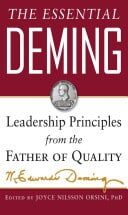 I was fortunate to be exposed to the writings of W. Edwards Deming before I even learned about Lean. While I sometimes get tired of reading new books on Lean and Toyota, I never tire of revisiting books
I was fortunate to be exposed to the writings of W. Edwards Deming before I even learned about Lean. While I sometimes get tired of reading new books on Lean and Toyota, I never tire of revisiting books by or videos featuring Dr. Deming. A few years back, I again re-read big chunks of “Out of the Crisis” and blogged about it here and here.
There's a timeless wisdom in what he said – and we're reminded of his work when exposed to people like my podcast guests Alfie Kohn, Dan Pink, Mike Micklewright, Samuel Culbert, Clare Crawford-Mason, Mike Stoecklein, and John Hunter.
We get to revisit Deming's wisdom in the recently published book “The Essential Deming: Leadership Principles from the Father of Quality.”
The book was compiled from a number of letters, papers, and speeches that Dr. Deming gave throughout his career, so it's mainly his own words, not somebody's interpretation of what he said and wrote.
I took a number of screenshots of some key passages and shared them via Twitter… collected on this “Storify” page, linked and embedded below. What are your favorite quotes? What flies in the face of today's conventional wisdom in the worlds of “lean management” or “traditional management?”
You can also read public highlights from Kindle readers including my own. The book was researched and edited by Professor Joyce Orsini and Kevin Cahill (Deming's grandson), who add some parenthetical context to Deming's words. Read about and listen to a podcast that my friend Joe Dager did with Orsini and Cahill.
One quote of Dr. Deming's made me stop and think about daily staff-driven Kaizen (as written about in Healthcare Kaizen)… Deming said this about Quality Circles (an early form of Kaizen):
In this article he states that if companies try to start their improvement efforts with QC-Circles, it will delay improvement… Moreover, little contribution from QC-Circles is possible except where the management is ready to act on recommendations of a Circle. The fact is that, in America, management is not ready… QC-Circles are the last step, not the first step, in improvement of quality and productivity… The first step is therefore good management. QC-Circles will follow naturally after good management is established.
Deming was right that staff involvement in improvement is pretty meaningless if management is not ready (if they are not willing to listen, to participate, to honor their employees, etc.). Read this recent blog comment about an organization that wasn't ready for Kaizen.
A core theme of Deming's was that senior leaders own the system… if the system is incapable of meeting customer and market needs, then having front-line staff just tweaking that process might be a form of “tampering” with a system. That's something to think and reflect more about. We often need radical system redesign to create stability and to move the mean performance of the system (this can be done through “kaizen events” or other systematic process redesign efforts) — then Kaizen is helpful. ThedaCare and Virginia Mason are two examples of organizations that have combined radical redesign with daily continuous improvement – and the same is true at my co-author's organization in Indianapolis (see pages 50-51 of our book for an example – or see this journal article of ours). The leaders are these organizations have proved theiy are ready and then some.
“The Essential Deming” Highlights
http://storify.com/leanblog/the-essential-deming-highlights
Disclosure: I was given a free copy of the book by the publisher, but I bought the Kindle version to travel with.
Please scroll down (or click) to post a comment. Connect with me on LinkedIn.
Let’s work together to build a culture of continuous improvement and psychological safety. If you're a leader looking to create lasting change—not just projects—I help organizations:
- Engage people at all levels in sustainable improvement
- Shift from fear of mistakes to learning from them
- Apply Lean thinking in practical, people-centered ways
Interested in coaching or a keynote talk? Let’s start a conversation.










Nice summary, Mark.
I see that you enjoyed the book as much as I did. I thought it was a great read, and it seems every time I go through it, I highlight another section. I am glad mine is on a Kindle.
It would be interesting to see, if any, what differentiates someone starting with Dr. Deming before Lean. My guess that the majority would be less tool orientated, but that is just a guess.
Joe – I think the “started with Deming before Lean” group is pretty much the same as the group of “know Lean and Deming.”
I took my first job out of college at a GM plant that supposedly followed “The Deming Philosophy” or “The Livonia Philosophy” as they called it. Ironically, it was just slogans on the wall (and I didn’t know that until I started actually working there).
As I’ve told my dad (who introduced me to Deming’s work) — reading Deming is both the BEST and WORST thing that ever happened to me. You see the world differently… which is great if you can take action on his ideas, but REALLY frustrating when you’re in the business world that’s under the “tyranny of the prevailing style of management.”
I cringe when I see Deming principles violated in Lean efforts:
– Choosing a consultant based on low bid
– Setting targets that the system is not capable of achieving and then blaming workers or expecting workers to fix it
– Relying on annual “performance appraisals” or incorporating Lean or Kaizen activity into that
– Setting departmental performance targets that suboptimize the system or hamper teamwork
– Not having a constancy of purpose
– Not understanding “common cause” vs. “special cause” variation
– Relying on slogans
etc.
There is, conceptually, a lot of overlap between the Toyota style of leadership and the Deming philosophy, since Deming is acknowledged by Toyota as being such a great influence on them.
It is indeed frustrating to believe in the enduring principles of Deming and the hypothesis that it leads to measurable and sustainable improvement. It IS both the best and worst thing to understand these principles and observe apathy or opposing behaviours in management across sectors. It begs the question “why have Taylorist (or other) approaches survived to 2013 if it is ineffective or if there are superior alternative management philosophies?”.
Here’s to hoping for a continued and precipitous evolution!
Taylorism has survived because, like many philosophies, it SOUNDS good.
As Homer Simpson said in an old episode, “In theory, communism works.”
Taylorism, among other things, plays right into the hands of engineers or highly-educated managers who think they are smarter than the workers. Being better educated doesn’t mean you are smarter, of course. There’s a certain “I’m better than you” arrogance that’s embedded in Taylorism.
There are other problems, such as “100% utilization” SOUNDING good, but not working in practice, as well.
As Dr. Deming pointed out, most business schools teach what companies do, looking in the rear view mirror, as opposed to teaching what companies and leaders SHOULD do.
Hi Mark, nice highlights! In healthcare we face exactly those hurdles you pointed out in the highlights. Reading them gave me a feeling of “deja vu” and “I told you so”. Managing by walking around is good for your daily exercise, not for learning and true leadership.
Thanks for these supporting messages!
Henk Veraart
Thanks for the comment, Henk. These are worldwide challenges. It’s even harder to get leaders to listen to Dr. Deming’s ideas than it is to get them to learn and practice Lean!
Mark,
Thanks for the heads up and I got the book and am reading it now. I actually got to hear Deming in one of his last talks. The quote from that talk that has haunted me for the last two decades was: “Some parts of the organization have to operate at a loss for the benefit of total organization.” I am paraphrasing this to the best of my memory. Has anyone ever seen this in print so that I can quote correctly. It does not Google well.
Anyway, when you think about across the board cuts, whether they are at the hospital or the federal sequester, it is easy to see that management or finance does not understand the “system” and see numerical goals as an end in themselves.
Hi Joye-
Yes, that quote sounds like one of Dr. Deming’s core themes, as he talks about in “The Essential Deming,” even if it’s not the exact words.
I agree with you that numerical goals are not a solution. As Dr. Deming often asked, “by what method?”
Setting a numerical target is not real leadership, in my book.
Mark
One of the highlights supports the need for a well-rounded education including history, economics, theory of law, etc.
One challenge I see for some Lean experts is that they may not have that type of education or experience. What they learned on the factory floor may be sufficient in a line-of-sight manufacturing operation with clear direction but insufficient in complex and often ambiguous industries like healthcare.
I am not saying that Lean manufacturing experts with limiited education can’t or don’t succeed in healthcare or that degrees from big-name schools assure success, but I strongly agree that a well-rounded education and experience is helpful in making Lean work in healthcare. I also warn people not to assume the shop floor Lean expert is going to be successful in healthcare.